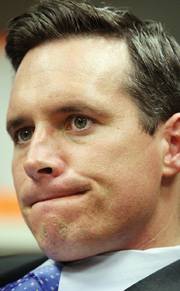Monday, July 6, 2009 | 2 a.m.

Sen. Bill Raggio, R-Reno, has been blamed for the failure to reform reporting laws, but his party was not in power this time around.

Secretary of State Ross Miller's bill was passed by the Assembly and amended by the Senate, but too late for a final Assembly vote.
Sun Archives
- Some argue against reform in name of holding good candidates' interest (4-8-2009)
- Given $50,000, he decides to run (5-6-2008)
- Editorial: Public in the dark (10-23-2007)
- Campaign donors little-noted in Nevada (3-19-2006)
Sun Blogs
Sun Coverage
Nevada’s campaign finance laws are written to favor incumbents and the special interests that fund them — and that won’t change any time soon.
Let’s say a candidate is weighing a run against an incumbent and wants to know how much money the office-holder has. That’s nearly impossible because candidates for office aren’t required to report money in the bank.
Perhaps a constituent wants to see who is funding a candidate’s campaign before deciding how to vote. Even getting that basic information can prove tricky. Many reports are written by hand and are suspiciously hard to read.
The reports also can’t be searched electronically, making it difficult to track an individual donor’s contributions.
Critics also take issue with the schedule for releasing candidates’ contribution and expense reports.
A week of early voting passes before final reports are due. (And that’s merely the date by which reports must be postmarked. If they’re mailed on the due date it can take several days for the reports to be released publicly.)
These issues earn Nevada’s campaign finance laws poor marks — the state is consistently ranked among the least transparent. It will stay that way for another election cycle as the Legislature once again failed to reform campaign finance laws.
Who is to blame for the bill’s failure?
When the Senate was controlled by Republicans, Democrats pointed fingers at Sen. Bill Raggio, R-Reno, who has long argued that stricter reporting requirements and transparency would discourage candidates from running for the Legislature, a part-time job that pays only $7,200 every other year.
Democrats took control of the state Senate this past election. This session it was harder to assign blame for the death of campaign finance reform.
Both the Senate and Assembly passed the bill — but in slightly different versions. But the session ended before they could reconcile the small differences, giving everyone involved plausible deniability.
Assembly Bill 82, proposed by Secretary of State Ross Miller, made it the furthest of any campaign finance bill this session. After the legislation spent 113 days in the Assembly, the lower house finally passed it out. The Senate had a week to hold hearings on it. The Senate amended the bill and it passed out at 12:30 a.m. on June 2, the final vote of the Legislative session.
The Assembly had already adjourned and the bill died because Assembly members never agreed to the Senate’s changes.
“I’m not sure why it died,” Miller said. “There were good pieces of policy in there that Nevada desperately needs. We always rank last or near-last in campaign finance transparency.”
Legislators had already watered down the bill. Provisions that would require candidates to file electronically were taken out after Republicans and Democrats worried that some candidates would have a hard time finding computer access. They were also concerned that qualified candidates would be scared away from running by more onerous reporting requirements, such as posting large last-minute contributions within 72 hours.
Critics, including some legislators, viewed that as merely an excuse for maintaining the status quo, which benefits incumbents and special interests that fund the politicians.
Assemblywoman Ellen Koivisto, D-Las Vegas and chairwoman of the Assembly Committee on Elections, Procedures and Ethics, said her committee spent four hearings trying to address all the concerns lawmakers had.
“I was amazed at the people who didn’t want to do electronic filing,” Koivisto said. “These were the same people sitting there with laptops every day, doing all kinds of things ... The excuse was so many of our people live way out somewhere and don’t have Internet access. My response to that? Bull.
“Everyone has access, I don’t care it you have to go to the library.”
Asked whether the public would be correct in believing that incumbents don’t want to change a system that benefits them, Koivisto said: “In some cases, that’s absolutely right. What other reasons could there be?”
Assemblyman Joe Hogan, D-Las Vegas, had his own bill, which would have matched dates to report campaign contributions with the primary and general elections. It would also require candidates to report the balances in their campaign accounts.
The bill never had a hearing.
“I never did really get an answer as to why,” he said. “I explained the bill to various staff members at various times. It seemed to me an obviously necessary thing.”
Hogan said campaign transparency “is really part of what people have a right to know — who is supporting which candidate. It’s part of unraveling why people are being supported, and who has a lot of influence over various candidates.”
Assembly Speaker Barbara Buckley referred questions about campaign finance bills to Koivisto and Assemblyman Marcus Conklin. Conklin did not return calls for comment.
Assemblywoman Sheila Leslie, D-Reno, said campaign finance reform is unlikely without constituent pressure.
“The only way it’s going to happen is if the public demands it,” she said. “The people who benefit the most from loose campaign finance rules are those in elected office.”
The ultimate solution to the state’s transparency problems, Leslie said, is public financing of campaigns.
“If you take the money out, you’ll get a lot more qualified people to run for office,” she said. “You’ll take away the power of special interests, who will not have as much influence.”

Join the Discussion:
Check this out for a full explanation of our conversion to the LiveFyre commenting system and instructions on how to sign up for an account.
Full comments policy